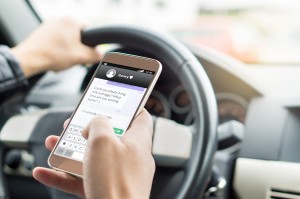Fatal Distraction
After legislators failed to make texting while driving a primary offense, how much worse will Florida’s distracted driving problems get?
Only four states in the U.S. do not consider texting while driving a primary offense: Ohio, Nebraska, South Dakota and Florida. In these states, drivers cannot be pulled over and ticketed solely for texting while driving; they must first be pulled over for another offense, such as speeding. Earlier this year, a law that would have made texting while driving a primary offense in Florida passed in the House of Representatives—by a vote of 112-2—but stalled in the Senate, effectively killing the issue until the legislature comes back in session in March 2019.
Senate Appropriations Chairman Rob Bradley (R-Fleming Island) cited privacy issues among his top concerns with the bill (SB 90), namely that it would give law enforcement the right to pull motorists over for simply checking directions on their phone, which is not illegal.
“My concern with the bill was fairly straightforward and simple,” Bradley says. “It is legal now, and would continue to be legal if the bill passed, to look at your phone for directions or to check the weather. A police officer who sees you do this could pull you over if this bill passed. In other words, an officer could pull you over for doing something that is perfectly legal. We should not pass laws that allow the government to pull you over for doing something that is perfectly legal.”
In order to prove that a person was texting, Bradley says the contents of an individual’s phone would have to be reviewed by law enforcement— something he and some of his colleagues consider an encroachment on privacy. “Many of my colleagues are constitutionalists like myself,” he says. “We are concerned with any proposed laws that have the potential to violate an individual’s right to be left alone when he or she has acted lawfully.”
Additionally, some in the Senate raised concerns about racial profiling, citing an ACLU study that showed black motorists were four times more likely to be pulled over than white ones after Florida passed its seat belt law. SB 90 was updated after these concerns were raised to allow for anyone pulled over for texting while driving to refuse a phone search, requiring police to obtain a warrant. This didn’t go far enough to earn a vote, however.
“I think every Floridian, of every race, should be concerned about protecting the sovereignty of the individual against unreasonable government encroachment,” Bradley says, adding that he doesn’t deny distracted driving is a problem. “Texting and driving is a serious and deadly problem. That’s why it’s illegal today. Floridians shouldn’t do it.”
The bill’s ultimate failure struck a chord across the state. Rep. Emily Slosberg (D-Boca Raton), who introduced the bill in the House, has been one of the most vocal advocates of road safety, especially considering her personal history. Slosberg lost her twin sister, Dori, in 1996 in a car accident that killed four others and left her severely injured. The twins were just 14.

“I will never forget learning that my twin sister and best friend was dead. I was in Delray hospital on a respirator, and I wrote on my father’s hand, ‘Where is Dori?’ It was the first time he was at a loss for words. He handed me the newspaper and I read that Dori was dead,” she says. “I do not want another person to go through what I have gone through, especially when these tragedies are preventable.”
Her father, former state Rep. Irv Slosberg, channeled his grief into action as a legislator, championing laws to make drivers safer.
“I was incredibly disappointed with the State Senate,” she says. “There is nothing more important than the safety of Floridians, especially our children. The most common form of communication for teens is texting. When you put a phone in the hands of an inexperienced driver, it’s a deadly combination. Every single day on our roadways, we see drivers who are texting. We are all guilty of it at some point. That’s because it is not against the law. … And it is time for the state to send a message that we will no longer tolerate this dangerous behavior on our roadways.”
The statistics alone show how distracted driving has become an epidemic in Florida. In 2017, the Florida Highway Patrol reported more than 50,000 crashes attributed to distracted driving statewide, with 220 fatalities. In Orange County, there were 6,972 crashes, 464 injuries and 31 fatalities.
Law enforcement officials feel a law would reduce these numbers, much the way drunk driving laws have made a difference. Orlando Police Department Chief John Mina, who penned an Orlando Sentinel column in favor of the texting while driving law, says he finds it “shameful that Florida is one of only a handful of states where texting while driving is not a primary offense.”
He had hoped the law would pass. “The law we were backing would have made texting while driving a primary offense and that would enable officers to make traffic stops if they spotted someone texting while driving. … We have seen a tremendous reduction in drunk driving as laws strengthened across the country. We need to put that same effort into ending the dangerous practice of texting while driving,” Mina says.
“I will continue to do everything I can to urge lawmakers to take up this issue again,” he continues. “Other states have led the way, and I believe that we as leaders have a responsibility to see that this becomes the law in Florida. In the meantime, we shouldn’t need legislation to do what is right. All of us must do our part to prevent these tragedies.”
For Slosberg, she is not willing to wait until next March to see this level of prevention come to pass. She has requested a special legislative session to vote and enact this legislation. “I decided to write the Secretary of State because I feel that the most important issue in our state is public safety,” she says. “Other members were calling for a special session for other issues, [and] while those issues are important, nothing is more important than the lives of every Florida resident and guest.” As of press time, her letter has gone unanswered.
Slosberg wonders how many more lives have to be lost before this legislation passes.
This article originally appeared in Orlando Family Magazine’s July 2018 issue.









